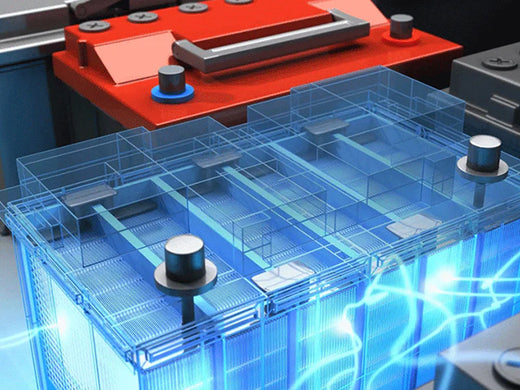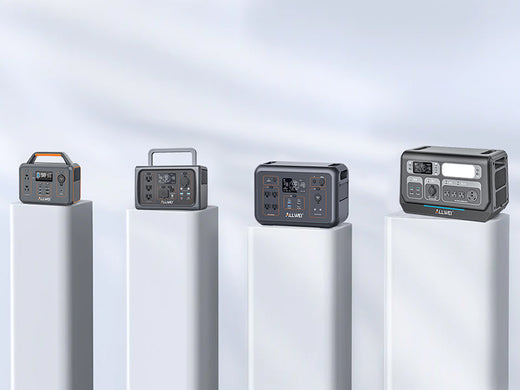In recent years, portable power stations have become the choice of more and more people in outdoor travel, camping, home power failure and backup, emergency, and other applications; because of their safety, long life, large power capacity, and recyclable advantages, it have become a consumer The best ideal choice for level backup power solutions;
You want a safe, non-toxic power station. But you also want a battery that’s going to perform well. When it comes to LiFePO4 vs. lithium ion, LiFePO4 is the clear winner. LiFePO4 vs Lithium-Ion Batteries: What do They Differ?

Chemical Compositions
LiFePO4 batteries, also known as lithium iron phosphate, are composed of lithium, iron, and phosphate ions, which makes them relatively safer, lighter, and more stable than other conventional batteries. On the other hand, lithium-ion batteries contain metallic lithium and composite cathode materials like cobalt, nickel, or manganese, making them highly energy-dense and efficient.
Safety
LiFePO4 batteries are often regarded as the safer of the two due to their chemistry, which is less prone to overheating or exploding. By contrast, while lithium-ion batteries are generally safe when used properly, they have been known to overheat and catch fire if they are damaged or improperly handled. Therefore, LiFePO₄ batteries are often preferred in applications where safety is a major concern like solar power systems, electric vehicles, and industrial equipment.
Energy Density
The energy density of a battery determines how much energy can be stored in a given volume or weight. In comparison to lithium-ion batteries, LiFePO4 is known for its superior safety and longer lifespan. However, the energy density of lithium-ion batteries is higher than that of LiFePO4 batteries. Lithium-ion batteries are widely used in consumer electronics and electric vehicles due to their high energy density, which results in longer-lasting battery life. Nonetheless, LiFePO₄ batteries are also highly suitable for specific uses, such as backup power, where safety and extended life are more essential.
Lifespan
LiFePO4 batteries offer a longer lifespan than lithium-ion batteries, with the ability to last up to 10 years in the right conditions. On the other hand, lithium-ion batteries typically last around 2-3 years. This is due to the chemistry and materials used in their construction. Of course, lifespan can also be affected by usage patterns, charging habits, and other factors, but the general consensus is that LiFePO4 batteries outlast their lithium-ion counterparts.
Weight
LiFePO4 batteries tend to be heavier than lithium-ion batteries due to their lower energy density. Of course, specific weights will depend on the size and capacity of each battery. If you're looking for the lightest weight option, lithium-ion batteries may be the way to go. However, if you're willing to trade some weight for increased safety and lifespan, LiFePO4 may be the better choice.
Temperature Range
LiFePO4 batteries generally have a wider temperature range than lithium-ion batteries. The operating temperature range for LiFePO4 batteries is typically between -20 to 60°C (-4 to 140°F), while Lithium Ion batteries have an operating range between 0 to 45°C (32 to 113°F). This means that LiFePO4 batteries can operate in colder or hotter environments without power degradation or damage to the battery pack. This factor makes LiFePO₄ batteries an excellent choice for applications that require reliable and stable battery power in extreme conditions, such as off-grid solar systems, electric vehicles, and marine applications.
Voltage
LiFePO4 batteries, with their unique chemistry, offer a lower voltage than traditional lithium-ion batteries. While this may seem like a drawback at first, it actually means that LiFePO4 batteries tend to last longer than their counterparts, as they discharge their energy more slowly and steadily. Lithium-ion batteries, on the other hand, generally offer a higher voltage but do not last as long due to more rapid energy discharge.
LiFePO4 vs. Lithium-Ion Batteries: Which One Is Right for You?
If you want to invest in a battery bank that you can use off-grid regularly, LiFePO4 is the right choice. The added safety features alone make it worth the investment—you won’t have to worry about the thermal runaway and overheating risks associated with Li-ion batteries.
The longer lifespan also makes LFP batteries the clear frontrunner. With a cycle life over five times as long, your LiFePO4 battery banks will still be running long after comparable Li-ion batteries have reached the end of their lifespan. You will save yourself money in the long run and minimize battery e-waste.
Plus, you can turn any LiFePO4 portable power station from ALLWEI power stations into a solar power generator by adding one or more solar panels!



Leave a comment
This site is protected by hCaptcha and the hCaptcha Privacy Policy and Terms of Service apply.